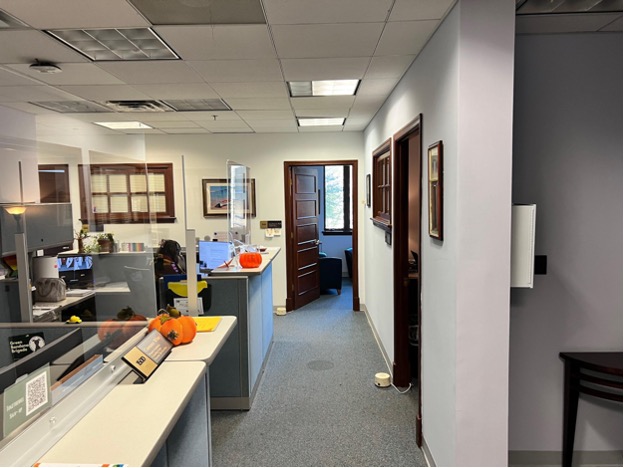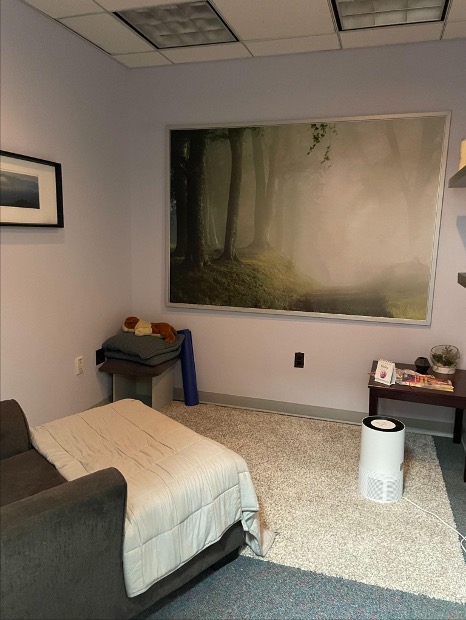The following represents the opinion of the student reporter and does not represent the views of Loyola University Maryland, the Greyhound, or Loyola University’s Department of Communication.
For many students at Loyola, the weight of academic expectations, social pressures, and personal challenges can feel overwhelming. As deadlines loom and the demands of school and life collide, it can be easy to feel lost in the shuffle. But at Loyola, there’s a quiet understanding that no one should have to carry that weight alone. Loyola has woven mental health support into the fabric of its community, ensuring that students know help is available—and that seeking it isn’t a sign of weakness, but a step toward growth.
Dr. Jason Parcover, Assistant Vice President for Student Well Being, sees firsthand the mental health struggles students face, especially during times of high academic pressure.
“By far, the number one challenge that students face during times of high academic pressure is anxiety and stress. We know from both Loyola data, but especially national data, that somewhere between 60-80% of students will report high levels of anxiety, at least a few times during the school year,” Parcover said.
But Loyola doesn’t stop at acknowledging the problem; it actively provides solutions through a wide range of services offered by the Counseling Center. From individual counseling to mental health workshops, the center’s goal is clear: to equip students with the tools they need to manage their mental health and succeed academically.
“We see over 45 percent of all students before they graduate,” Dr. Parcover said. “Students who seek counseling graduate with higher GPAs than those who don’t and are more likely to graduate with honors.”
The Counseling Center offers a variety of mental health workshops designed to meet the needs of a diverse student body. Programs like “Anxiety Toolbox” and “RIO: Recognition, Insight, and Openness” provide students with practical strategies for managing stress and improving mindfulness.
Dr. Parcover said, “These workshops have been incredibly helpful…We’re seeing really positive feedback from students who say they feel more in control of their anxiety after attending.”
Beyond the workshops and counseling sessions, Loyola’s approach to mental health is woven into campus culture. One of the most visible symbols of this is the Green Bandana Brigade, an initiative that equips students with basic mental health training and encourages them to show their support for their peers by tying a green bandanna on their backpacks.
“We want folks to feel like they’re part of a supportive community,” Dr Parcover says. “We have over 300 students who are part of the Green Bandana Brigade. These students are prepared to offer a listening ear or direct someone to resources when they need it most.
For Olivia Paré ‘25 Director of Student Support at Loyola and president of the university’s chapter of Active Minds, normalizing mental health discussions on campus is more than just a responsibility—it’s a passion.
Active Minds, a national organization with a strong presence at Loyola, works to raise awareness and reduce the stigma surrounding mental health challenges.
“Our main goal is to make students feel included and supported at Loyola through our events, by highlighting resources, and by trying to normalize mental health in a variety of ways,” Paré said.
Active Minds is known for its impactful campus events, such as “I Will Listen” week, held in collaboration with the National Alliance on Mental Illness (NAMI). These events encourage students to openly discuss mental health and learn about the resources available to them. Paré also spearheaded a walk team for the American Foundation for Suicide Prevention’s Out of the Darkness Walk, a cause that has already raised over $2,400 from the Loyola community.
“It’s about making sure students know they’re not alone,” Paré said. “Programs like the Green Bandana Brigade make it easier for students to see that help is all around them.”
Loyola’s Mental Health Task Force, made up of faculty, staff and student representatives, also plays a pivotal role in creating a campus culture that prioritizes mental health. Dr. Janet Pries, a member of the task force, believes that while many faculty members care deeply about their students’ well-being, they often hesitate because they don’t feel equipped to handle mental health issues.
“Caring is never wrong,” Dr. Pries said. “For most of us, I think this is a human condition—when I don’t know what to do, my default will be to do nothing. The task force is about giving people the tools they need to feel confident in reaching out and supporting others.”
During the pandemic, the need for mental health resources became even more urgent, leading Loyola to introduce new tools like TogetherAll, an anonymous online platform where students can connect with others experiencing similar challenges. Dr. Lisa Oberbroeckling, another member of the Mental Health Task Force, sees Togetherall as an essential resource for students who may be hesitant about seeking help in person.
“It’s completely anonymous and virtual, which is powerful for students who may feel hesitant to seek help publicly,” Oberbroeckling said. “What it allows for is for students to have a community, and it is a community that is really grounded in mental health.”
This focus on building a supportive culture is a key part of Loyola’s broader mental health strategy. At the heart of these efforts is the university’s commitment to its Jesuit pillars, which shape every initiative.
“The foundation of these mental health initiatives is deeply rooted in Loyola’s Jesuit values, particularly cura personalis, the idea of caring for the whole person,” Dr. Pries said.
“It isn’t that we integrate cura personalis into our mental health initiatives,” Pries said. “It’s that cura personalis is the foundation. Everything we do builds on that ground.”
At Loyola, the message is clear: mental health matters. Through the Counseling Center’s services, Active Mind’s initiatives, and the ongoing support of faculty and staff, students should never walk alone with their struggles. Whether through a conversation with a peer with a green bandana binded to their backpack for attending a workshop, Loyola is working to ensure that every student knows they have a community of care behind them.
The Counseling Center is open Monday through Friday from 8:30 a.m. to 5:00 p.m. Students can schedule an appointment by calling the center at (410)-617-2273 or by visiting their website to make an online request. For urgent mental health needs outside of regular hours, students can access the center’s 24/7 crisis line by calling (410)-617-5530. The Counseling Center also has an on-call emergency counselor available every day, providing immediate assistance to those in distress.













































































































